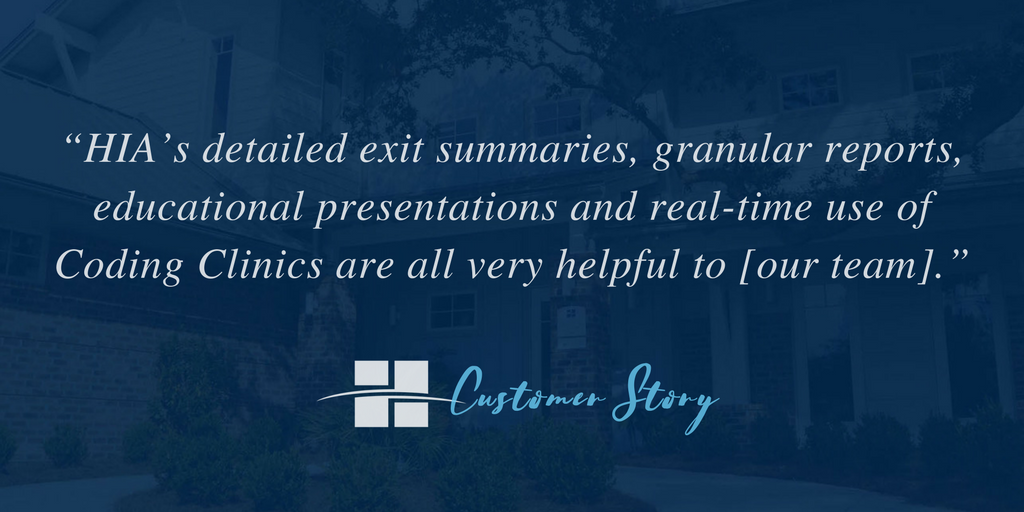Partnering with HIA for Interim Auditing services provides immediate solutions to fill the gap in your Health Information Leadership team so you can maintain productivity and performance. How? Read Marsha’s story below.
“I wanted to find a process that made sure we were giving our coders everything they needed to succeed, including a fresh perspective,” said Marsha*, Director of Coding & CDI at one of the nation’s top-ranked teaching hospitals.
Previously, Marsha relied on a team of four internal audit/educators, two inpatient and two outpatient, who were primarily responsible for mentoring, auditing, and providing feedback to new hires and coders in training. At that time her audit team was feeling overwhelmed and needed assistance to meet their goals. Marsha was faced with the challenge of deciding whether to take on the expense of another full-time auditor, or pursue other options. After conducting a thorough analysis, and weighing the pros and cons, she determined a partnering solution just might be the positive change they needed.
“It’s pretty common for hospitals to outsource one external audit each year as a ‘temperature check’ to see if an external set of eyes may identify any opportunities that need to be addressed. However, after thinking it through, it just made better sense to have that external feedback on a consistent basis.”
Marsha already had a good relationship with HIA and reached out to them for help.
“Together, we developed the model we now have in place; every month the external and internal monitoring efforts are combined. Whether it’s a 100% audit of a new employee, or doing some focused reviews to make sure we are accomplishing our internal goals, the aggregate sum of those results helps me target my educational efforts AND meet my corporate compliance requirements.”
It Makes Good Business Sense
Sherry, HIA’s Coding Consultant, has been working with Marsha and her team as an interim auditor for nearly two years now. Bringing Sherry on board before ICD-10 implementation proved to be perfect timing.
“If we had waited to do our traditional annual audit, it would have been six or nine months post ICD-10 before we received external feedback. That would have been waiting way too long to figure out that my team had already picked up some bad habits and needed to learn how to undo them,” Marsha explained.
Sherry’s main directive is to work one on one with the coders under prebill review to provide them with the education and daily feedback they need to enhance their coding skills. Once they are fully onboard with the hospital, Sherry reviews a sample of their work quarterly to fine tune their skills.
On occasion, Marsha will ask Sherry to review either random or focused samples on the staff as a whole. Based on those results, she may be instructed to do additional targeted review on the coders who are not progressing as quickly or show specific deficiencies. In conjunction with HIA’s trending report capability, this approach also helps identify common opportunities across the board.
“Once we have a month or two of data on both the inpatient and outpatient sides, I might ask her to take an hour during our all-staff meetings to hit the highlights for everyone. Of course this is done on an anonymous basis. The approach has proven helpful to our coders because they are not only learning from their own cases, but also from those that were coded by others. All without having to embarrass any one individual in the process. After all, we are a team and everyone is reaching for the same goals.”
One of the things Marsha likes about Sherry conducting these ‘educational reviews’ is that they feel less punitive.
“Sherry is like Switzerland. I don’t have to worry about feelings getting hurt; sometimes one can feel picked on in an internal report.”
For Sherry, it’s so much more than making sure they get the right DRG.
“The coders and I have weekly calls to go over any questions they may have. Not everyone processes information in the same way. They need more feedback than just numbers and statistics.”
Marsha says the response she has gotten from her staff is overwhelmingly positive.
“HIA’s detailed exit summaries, granular reports, educational presentations and real-time use of Coding Clinics are all very helpful to them.”
She states that the success of the partnership is showing up in more than just increased production. Marsha believes her team now has a more consistent message than before and her coders are sharper and paying more attention to detail.
“My corporate compliance department really likes this model we are using now because it makes good business sense. Issues that could translate into millions of dollars of exposure are identified and addressed in a timely fashion. It’s important to capture them early.”
Her financial leaders aren’t complaining either. In the time since Sherry has been working with hospital, Marsha has been able to leverage four auditors’ salaries towards production coding instead of outsourcing more contract coders.
“I’m trying to build a pipeline of coders. I reassigned my four internal auditors as individual team leaders. Those senior coders are now responsible for 50% production coding and 50% mentoring of their teams. Their skills are being better utilized and they are able to lead by example resulting in more success for all. Coder I’s are becoming Coder II’s and Coder II’s are becoming III’s.”
Marsha is happy she trusted her instincts to partner with HIA for interim auditing.
“The detail of audits and regular feedback have been really good. Being able to complete what we’ve wanted to accomplish in a certain time frame has been a big factor in our success; especially since the transition to ICD-10.”
*names have been altered for privacy purposes.
Learn more about HIA's Interim Auditing services.




